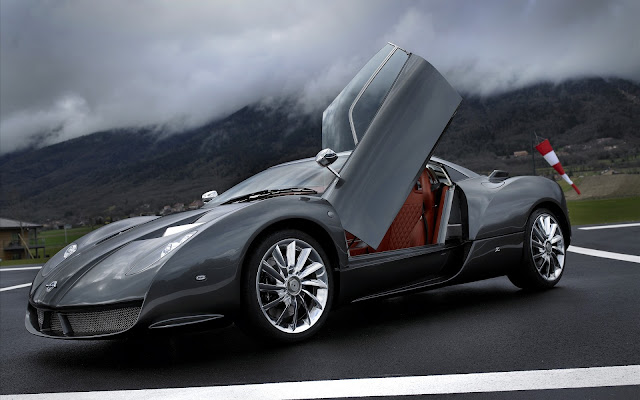MacBook charging peacefully beside my PC desktop
My brother noticed a pale grey smoke or haze rising among the houses in front of them, and veiling the white facade of a terrace beyond the road that appeared between the backs of the villas. Mrs. Elphinstone suddenly cried out at a number of tongues of smoky red flame leaping up above the houses in front of them against the hot, blue sky. The tumultuous noise resolved itself now into the disorderly mingling of many voices, the gride of many wheels, the creaking of waggons, and the staccato of hoofs. The lane came round sharply not fifty yards from the crossroads.
"Good heavens!" cried Mrs. Elphinstone. "What is this you are driving us into?"
My brother stopped.
For the main road was a boiling stream of people, a torrent of human beings rushing northward, one pressing on another. A great bank of dust, white and luminous in the blaze of the sun, made everything within twenty feet of the ground grey and indistinct and was perpetually renewed by the hurrying feet of a dense crowd of horses and of men and women on foot, and by the wheels of vehicles of every description.
Two men came past them. Then a dirty woman, carrying a heavy bundle and weeping. A lost retriever dog, with hanging tongue, circled dubiously round them, scared and wretched, and fled at my brother's threat.
So much as they could see of the road Londonward between the houses to the right was a tumultuous stream of dirty, hurrying people, pent in between the villas on either side; the black heads, the crowded forms, grew into distinctness as they rushed towards the corner, hurried past, and merged their individuality again in a receding multitude that was swallowed up at last in a cloud of dust.
"Go on! Go on!" cried the voices. "Way! Way!"
One man's hands pressed on the back of another. My brother stood at the pony's head. Irresistibly attracted, he advanced slowly, pace by pace, down the lane.
"To think of it! I've seen this beach alive with men, women, and children on a pleasant Sunday. And there weren't any bears to eat them up, either. And right up there on the cliff was a big restaurant where you could get anything you wanted to eat. Four million people lived in San Francisco then. And now, in the whole city and county there aren't forty all told. And out there on the sea were ships and ships always to be seen, going in for the Golden Gate or coming out. And airships in the air—dirigibles and flying machines. They could travel two hundred miles an hour. The mail contracts with the New York and San Francisco Limited demanded that for the minimum. There was a chap, a Frenchman, I forget his name, who succeeded in making three hundred; but the thing was risky, too risky for conservative persons. But he was on the right clew, and he would have managed it if it hadn't been for the Great Plague. When I was a boy, there were men alive who remembered the coming of the first aeroplanes, and now I have lived to see the last of them, and that sixty years ago."
The old man babbled on, unheeded by the boys, who were long accustomed to his garrulousness, and whose vocabularies, besides, lacked the greater portion of the words he used. It was noticeable that in these rambling soliloquies his English seemed to recrudesce into better construction and phraseology. But when he talked directly with the boys it lapsed, largely, into their own uncouth and simpler forms.
"But there weren't many crabs in those days," the old man wandered on. "They were fished out, and they were great delicacies. The open season was only a month long, too. And now crabs are accessible the whole year around. Think of it—catching all the crabs you want, any time you want, in the surf of the Cliff House beach!"
A sudden commotion among the goats brought the boys to their feet. The dogs about the fire rushed to join their snarling fellow who guarded the goats, while the goats themselves stampeded in the direction of their human protectors. A half dozen forms, lean and gray, glided about on the sand hillocks and faced the bristling dogs. Edwin arched an arrow that fell short. But Hare-Lip, with a sling such as David carried into battle against Goliath, hurled a stone through the air that whistled from the speed of its flight. It fell squarely among the wolves and caused them to slink away toward the dark depths of the eucalyptus forest.
"Good heavens!" cried Mrs. Elphinstone. "What is this you are driving us into?"
My brother stopped.
For the main road was a boiling stream of people, a torrent of human beings rushing northward, one pressing on another. A great bank of dust, white and luminous in the blaze of the sun, made everything within twenty feet of the ground grey and indistinct and was perpetually renewed by the hurrying feet of a dense crowd of horses and of men and women on foot, and by the wheels of vehicles of every description.
"Way!" my brother heard voices crying. "Make way!"It was like riding into the smoke of a fire to approach the meeting point of the lane and road; the crowd roared like a fire, and the dust was hot and pungent. And, indeed, a little way up the road a villa was burning and sending rolling masses of black smoke across the road to add to the confusion.
 |
| Macbook Accessories |
So much as they could see of the road Londonward between the houses to the right was a tumultuous stream of dirty, hurrying people, pent in between the villas on either side; the black heads, the crowded forms, grew into distinctness as they rushed towards the corner, hurried past, and merged their individuality again in a receding multitude that was swallowed up at last in a cloud of dust.
"Go on! Go on!" cried the voices. "Way! Way!"
One man's hands pressed on the back of another. My brother stood at the pony's head. Irresistibly attracted, he advanced slowly, pace by pace, down the lane.
"To think of it! I've seen this beach alive with men, women, and children on a pleasant Sunday. And there weren't any bears to eat them up, either. And right up there on the cliff was a big restaurant where you could get anything you wanted to eat. Four million people lived in San Francisco then. And now, in the whole city and county there aren't forty all told. And out there on the sea were ships and ships always to be seen, going in for the Golden Gate or coming out. And airships in the air—dirigibles and flying machines. They could travel two hundred miles an hour. The mail contracts with the New York and San Francisco Limited demanded that for the minimum. There was a chap, a Frenchman, I forget his name, who succeeded in making three hundred; but the thing was risky, too risky for conservative persons. But he was on the right clew, and he would have managed it if it hadn't been for the Great Plague. When I was a boy, there were men alive who remembered the coming of the first aeroplanes, and now I have lived to see the last of them, and that sixty years ago."
 |
| Macbook Gaming |
"But there weren't many crabs in those days," the old man wandered on. "They were fished out, and they were great delicacies. The open season was only a month long, too. And now crabs are accessible the whole year around. Think of it—catching all the crabs you want, any time you want, in the surf of the Cliff House beach!"
A sudden commotion among the goats brought the boys to their feet. The dogs about the fire rushed to join their snarling fellow who guarded the goats, while the goats themselves stampeded in the direction of their human protectors. A half dozen forms, lean and gray, glided about on the sand hillocks and faced the bristling dogs. Edwin arched an arrow that fell short. But Hare-Lip, with a sling such as David carried into battle against Goliath, hurled a stone through the air that whistled from the speed of its flight. It fell squarely among the wolves and caused them to slink away toward the dark depths of the eucalyptus forest.








